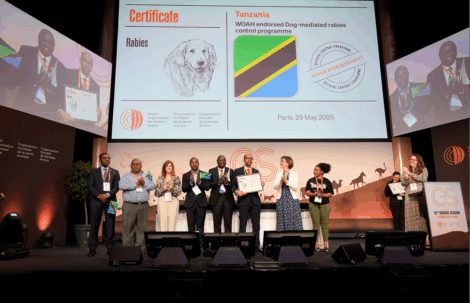Official rabies control endorsement in Tanzania: A landmark achievement for East Africa

In 2025, Tanzania became the first East African country to have their National Rabies Control Plan officially endorsed by the World Organisation for Animal Health (WOAH). This milestone underlines the country’s concerted effort to eliminate human deaths from dog-mediated rabies.
Although Tanzania’s National Rabies Control Plan was officially endorsed at WOAH’s 92nd General session, the country’s Veterinary Services, directed by Dr Benezeth Lutege Malinda, had been collaborating with local authorities, health professionals, veterinarians, community leaders and non-governmental organisations (NGOs) on this strategy for years. The goal: stop the transmission of dog-mediated rabies in five years.
“I can say that, for Tanzania, this endorsement is a milestone for our nation,” says Dr Malinda, “it shows that we are determined, as a country, to make sure we utilise and maintain this endorsement, so that by 2030, we’ll be among the countries with zero rabies.”
Annually, about 1,500 cases of human rabies are reported in Tanzania — a great majority of which originate from dog bites. Stopping transmission cycles at its animal source is a critical step in eliminating the disease. This, supported by dog population management, which are strategies that can include promoting responsible pet ownership, ensuring access to veterinary care, neutering or spaying and education campaigns, could bring this number down to nearly zero.
“Once you’ve tasted the sweetness of being endorsed, you want to keep going.”
The 2025 official WOAH endorsement of Tanzania’s National Rabies Control Plan is not the country’s first. Previously, Tanzania received its first official endorsement from WOAH (then called OIE) for its national plan to control rinderpest. “That endorsement helped guide the country in following all the steps laid out in the control strategy,” Dr Malinda reflects, “And eventually, we managed to eradicate rinderpest.”
Emboldened by this success, Tanzania is confident that it will eliminate rabies and, in the future, rid itself of peste des petits ruminants (PPR).
Planning for elimination
Three years of strategy went into Tanzania’s National Rabies Control Plan, which — as one of its main objectives — brought together independent NGOs to work together in pursuit of the same goal. Throughout the years of coordination, the country was able to map the disease, identifying high- and low-risk areas in order to eliminate rabies methodically and progressively.
We’ve created a sort of ‘rollback’ plan. Some areas are already free from rabies — we can consider them clean — so we focus on keeping them clean while gradually addressing the higher-risk zones. And now, [Tanzania’s Veterinary Services and NGOs] are working as a team, following the analysis we submitted in our dossier.
Dr Benezeth Lutege Malinda, Director of Tanzania’s Veterinary Services and WOAH Delegate.
On top of targeted, NGO-assisted action, public-private partnerships are also a driving force behind Tanzania’s rabies control strategy. “[Rabies] really affects the lower-income communities.” Dr Malinda continues, “And sometimes, the government — especially when acting alone — cannot reach the grassroots where common people are suffering from rabies. But the private sector is present throughout the country.” To strengthen this collaboration between public and private sectors, Tanzania created an initiative called the Tanzania Animal Health Organisation (TAHO), which is dedicated to promoting animal health and welfare in support of the country’s livestock sector. “This has greatly contributed to our efforts in implementing our strategies. The private sector organises itself across different regions, while the government ensures that any barriers are removed so we can achieve our goals.”
Private-public partnerships also play a key role in easing the financial burden of animal welfare initiatives, like implementing the country’s rabies control plan, by financing certain activities to move things forward. “Right now, for example,” explains Dr Malinda, “there are people already in the field conducting rabies awareness campaigns, neutering programs, and vaccinations — all coordinated through our national portal, with the private sector implementing them on the ground.”
To ensure a smooth rollout of its National Rabies Control Plan, the country has invested in storage facilities in which vaccines, donated through the private sector or bought by the government, can be reserved for use in emergency situations. This paired with disease surveillance will give the Veterinary Authority a head start if any districts show an unexpectedly high risk of infection.
Shaping tomorrow
The success of Tanzania’s National Rinderpest Control Plan, from around 20 years ago, has lit a fire under the country, making it even more motivated to eliminate rabies in the next five years. “In the same spirit, we see rabies as another deadly — but preventable —disease,” affirms Dr Malinda, “We’re very positive. And not only with rabies, we’re also aligning with global efforts on PPR.”
As he looks forward to beginning the process to obtain a third endorsement for the country, Dr Malinda encourages other Members to do the same. According to him, the advantages of endorsement are well worth the effort. The trust that comes from having an official WOAH certification translates into new partnerships, policy changes and investment into the programme and Veterinary Services more broadly.
“I advise my colleagues in other countries: sit down, prepare your dossier. It’s not an easy task — it really requires dedication. You have to sit down, focus, and come up with a strong, scientifically sound document. The scientific committee is very thorough. They evaluate everything, word by word. But once you’re endorsed, it brings a sense of pride and recognition. You see your country up there, and it motivates not only us as Veterinary Professionals, but the whole country and our partners around the world. It’s up to us—as experts, as Directors of Veterinary Services, as professionals in the veterinary field—to take the initiative.” – Dr Benezeth Lutege Malinda.

